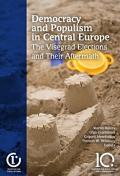Bútora Martin, Gyárfášová Oľga, Mesežnikov Grigorij, Skladony W. Thomas
Author
Bútora Martin, Bútorová Zora, Fomina Joanna, Gabal Ivan, Gyárfášová Oľga, Krause Kevin, Krivý Vladimír, Kucharczyk Jacek, Kéri Lázsló, Lang Kai-Olaf, Mesežnikov Grigorij, Rupnik Jacques, Shepherd Robin, Strážay Tomáš, Szomolányi Soňa, Tamás Pál, Učeň Peter
Imprint
IVO, Bratislava, 2007
Language
English
Annotation
The 2005–2006 parliamentary elections in
In September 2006 the Institute for Public Affairs convened an international conference in
Most of the contributions in this volume, Democracy and Populism in Central Europe: The Visegrad Elections and Their Aftermath, are revised and updated versions of papers presented at this IVO conference. The volume begins with a comparative introduction to the party systems and coalition behaviors in the Visegrad Group countries. Part One then presents four individual-country election case studies. Part Two features a set of chapters that place the rise of populism in the Visegrad Group within the comparative context of
The diversity of professional backgrounds of the book’s contributors has resulted in what the editors believe is a useful mix of contributions, ranging from political narratives and commentary to empirical and theoretical analyses. The publication will be accessible to broad audience of policy makers, diplomats, journalists, academics, and civic activists. We hope that readers of Democracy and Populism in Central Europe: The Visegrad Elections and Their Aftermath find it to be a valuable source of information and analysis on domestic developments in
| Product details | ||
| Number of pages | 248 | |
| Format | paperback | |
| ISBN | 978-80-88935-96-4 | |













